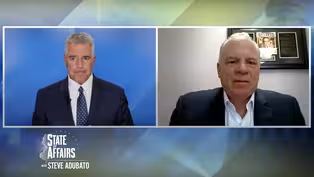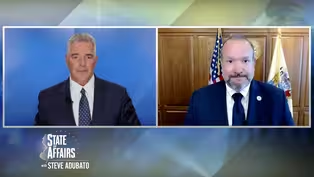State of Affairs with Steve Adubato
The Overlap Between Environmental and Racial Injustice
Clip: Season 7 Episode 13 | 10m 17sVideo has Closed Captions
The Overlap Between Environmental and Racial Injustice
Natasha Dyer, Executive Director of Greater Newark Conservancy, joins Steve Adubato to address the intersection of environmental and racial injustice and the impact this has on Newark’s access to fresh and nutritious foods.
Problems playing video? | Closed Captioning Feedback
Problems playing video? | Closed Captioning Feedback
State of Affairs with Steve Adubato is a local public television program presented by NJ PBS
State of Affairs with Steve Adubato
The Overlap Between Environmental and Racial Injustice
Clip: Season 7 Episode 13 | 10m 17sVideo has Closed Captions
Natasha Dyer, Executive Director of Greater Newark Conservancy, joins Steve Adubato to address the intersection of environmental and racial injustice and the impact this has on Newark’s access to fresh and nutritious foods.
Problems playing video? | Closed Captioning Feedback
How to Watch State of Affairs with Steve Adubato
State of Affairs with Steve Adubato is available to stream on pbs.org and the free PBS App, available on iPhone, Apple TV, Android TV, Android smartphones, Amazon Fire TV, Amazon Fire Tablet, Roku, Samsung Smart TV, and Vizio.
Providing Support for PBS.org
Learn Moreabout PBS online sponsorship[INSPRATIONAL MUSIC STING] - Hi everyone, Steve Adubato.
We kick off the program with Natasha Dyer who is Executive Director of a terrific organization called the Greater Newark Conservancy.
Natasha, great to have you with us.
- Thank you for having me.
It's a pleasure to be here.
- You got it.
As we put up the website tell everyone what the Greater Newark Conservancy is.
- Sure, so Greater Newark Conservancy is an amazing organization here in the city of Newark, and we work at the intersections of environmental justice, food justice, and racial justice to improve the health and wellbeing of Newark residents and beyond.
- And you're the first person of color to lead this organization in 35 years of existence.
Significant for a lot of reasons.
But you mentioned racial injustice slash justice.
Put that in perspective in terms of the work the conservancy does.
- Sure, so at the Conservancy, the bulk of our work is in the area of food justice and environmental justice.
We run and operate the largest urban farm in the state of New Jersey.
We also have an urban environmental learning center, an outdoor environmental learning center with 10 learning gardens.
And we do a lot of nutrition and health work in schools and in community.
Now, the impact of racial justice on community of colors and in particular when it comes to food access has been extensive, right.
So, these are things impacted by redlining, disinvestment, and urban, I would say environmental injustice, where you have lots of companies doing illegal dumping or contamination in less affluent cities.
So, a place like the city of Newark, we've been affected by decades of environmental injustice where we still feel the impacts of contamination in our soil, our air, and our water.
- By the way, the term redlining, some people may hear it and not know exactly what it means.
There's a history of redlining, which is not written into the law, but it's written into practice, which is to have folks who are involved in, let's say, real estate in urban communities or a whole range of communities, making sure that only certain people are able to purchase in those communities and that would often exclude people of color.
- Right.
- Natasha, let me ask you this the issue of food.
Connect food to racial justice, more specifically with a concrete example, please.
- Sure.
So for example, the city of Newark, much of it has been designated a food desert, right?
For much of the reasons that we've just discussed, particularly redlining where it limits access to land for people of color.
Coupled with that, you have things like urban blight where affluent people may flee or move away from the area due to redlining and so, that in turn exacerbates access or reduces access where companies, larger companies are reluctant to move into certain communities where we end up having food deserts like we do in Newark.
So, in the Clinton Hill section of Newark where our Hawthorne Avenue farm is located, that has been designated a food desert because we have, what, over 2000 residents who live more than one mile away to access for healthy food and fresh vegetables.
So, our organization mitigates the gap to access by providing residents with the ability to harvest their own produce.
We have 269 raised beds at our farm that community members can purchase for as low as $15 for the entire year.
And then they're able to harvest their own produce for their families and neighbors.
And that goes a long way to promoting food access and food sovereignty for community.
- Natasha, I'm sorry for interrupting.
Let me try this.
So, for so many of us for whom fruit and vegetables, very accessible, right?
- Yes.
- I happen to live in Montclair, born and raised in Newark, but live in Montclair.
And for the vast majority of people watching right now fruit and vegetables, very accessible, right?
Inflation's what it is, but very accessible.
Not the case in Newark.
And so, particularly for children, I'm sorry, Natasha, but particularly for children, our children, the children of Newark, the inability to access fruit and vegetables has a terrible impact on them.
Not just for now, but in the future.
Talk about that, please.
- Yes, so access to healthy food, healthy fruits and vegetables at a young age has a tremendous impact on learning outcomes and health outcomes, right?
We know that access to healthy foods contributes to your physical health in terms of mitigating chronic diseases like diabetes and obesity, which has impacted our communities in large measure due to things like our community members living in food deserts.
And when it comes to education, what you put in your body contributes to your ability to think clearly and to be alert in school.
And we also know that spending time in nature reduces anxiety and stress, which a lot of our students and families are still experiencing as we've come out of COVID, and becoming readjusted or reacclimated to the new normal.
- Natasha, where did you grow up?
- Yeah, so I am a fourth generation Newarker.
I was born and raised here in the city of Newark.
And joining the conservancy was, in many ways, a homecoming for me because my great grandmother used to own a house on Richmond Street, which is just one block above where we are at the conservancy.
So, I've watched this entire area transform.
- Richmond Street is that in the South Ward of Newark.
- Richmond Street is in a Central Ward of Newark where our main campus is, and that is the location of our outdoor urban environmental learning center.
- And your passion for this work comes from where?
- It comes from growing up in the South Ward of Newark.
My grandparents always maintained a vegetable garden.
So, we grew up gardening with them.
Their relatives were from the south, so they grew up on farms and it was a way of life for them.
And so, it became a way of life for me.
- So, it's so interesting that, as I said, so many of us take for granted the access to fruit and vegetables and healthy food.
But one more quick question before we let you go.
Environmental justice.
- Yes.
- Newark has a disproportionate number of toxic waste sites and what is under the ground often impacts the ability or inability to grow.
- Right.
- What needs to be grown.
And also it's just a basic health hazard.
How the heck do you and your colleagues at the conservancy deal with the plethora of sites, most of which we don't really understand, 'cause it's underground.
I know it's a complicated question, but I think about that a lot.
- Yeah.
Well, it's slow and steady, I would say.
So, as I mentioned before, we have 269 raised beds at our Hawthorne Avenue Farm.
Part of that is due to potential contamination in the land, right?
So we're not able to plant directly in the ground, so we facilitated raised beds so that community members can still benefit from it.
However, we know that community members, for example, in the Iron Bound cannot plant in a large portion of the sections out there.
- It's worse there.
It's worse in the Iron Bound.
- Yes, absolutely.
- All the chemicals and the industrial, when there were no laws or the laws were being ignored.
I'm sorry, Natasha, please.
- Right, exactly.
So again, we're still experiencing the devastation of those decades of illegal dumping and things of that nature.
- That's right.
- So, places like Down Bottom Farms which is in the Iron Bound, places like the Greater Newark Conservancy, we do tremendous, tremendous service to the community by harvesting fruits and vegetables to make it accessible to community members.
Not only just in terms of proximity, but in terms of pricing.
As you mentioned with inflation and everything else that's going on, it's important that community members are able to afford to be healthy.
- Natasha Dyer is the Executive Director of The Greater Newark Conservancy.
This will not be the last time you join us and we appreciate you joining us now.
Thank you, Natasha.
- Thank you so much.
- You got it.
Stay with us, we'll be right back.
- [Narrator] State of Affairs with Steve Adubato Is a production of the Caucus Educational Corporation.
Funding has been provided by The Healthcare Foundation of New Jersey.
New Jersey'’s Clean Energy program.
PSE&G, Community FoodBank of New Jersey.
Operating Engineers, Local 825.
IBEW Local 102.
NJM Insurance Group.
Eastern Atlantic States Regional Council of Carpenters.
And by The New Jersey Economic Development Authority.
Promotional support provided by The New Jersey Business & Industry Association.
And by New Jersey Monthly.
NJM Insurance Group has been serving New Jersey businesses for over a century.
As part of the Garden State, we help companies keep their vehicles on the road, employees on the job and projects on track, working to protect employees from illness and injury, to keep goods and services moving across the state.
We're proud to be part of New Jersey.
NJM, we've got New Jersey covered.
Steve Sweeney Discusses the Future of Offshore Wind Industry
Video has Closed Captions
Clip: S7 Ep13 | 9m 21s | Steve Sweeney Discusses the Future of Offshore Wind Industry (9m 21s)
The Value of Apprenticeships and Worker Protection Programs
Video has Closed Captions
Clip: S7 Ep13 | 8m 31s | The Value of Apprenticeships and Worker Protection Programs (8m 31s)
Providing Support for PBS.org
Learn Moreabout PBS online sponsorship
- News and Public Affairs

Top journalists deliver compelling original analysis of the hour's headlines.

- News and Public Affairs

FRONTLINE is investigative journalism that questions, explains and changes our world.












Support for PBS provided by:
State of Affairs with Steve Adubato is a local public television program presented by NJ PBS

